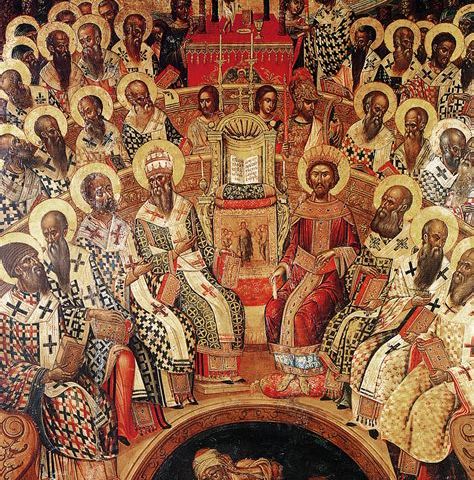I.M. Andreyev on the Moscow Patriarchate - Session 7

Iscriviti gratuitamente
Ascolta questo episodio e molti altri. Goditi i migliori podcast su Spreaker!
Scarica e ascolta ovunque
Scarica i tuoi episodi preferiti e goditi l'ascolto, ovunque tu sia! Iscriviti o accedi ora per ascoltare offline.
Descrizione
"Our Struggle," Class 13 - "Is the Grace of God Present in the Soviet Church?" In this final section of the essay, the author asks and answers the question: "Is...
mostra di piùIn this final section of the essay, the author asks and answers the question: "Is the grace of God present in the Soviet Church?"
R. 1st Argument for validity of the MP - Recognition by the Patriarchates - pp. 49 - 50
1. Argument is that since Constantinople and the other Eastern Patriarchates recognize the MP, it is thereby canonical and grace-bearing.
2. Refutation:
a. The Ecumenical Patriarchate also recognized the "Living Church." Does that mean that they and not the Church under Patriarch Tikhon was the real Church at that time?
b. The Church leaders outside Russia do not comprehend the actual situation there. Their recognition of the MP is based on ignorance and therefore is not valid.
c. Even if they do know what is going and yet still recognized the Sergianist church, their recognition does not change anything. Truth is truth, and falsehood is falsehood. They do not have the power to change reality.
S. 2nd Argument for validity of the MP - The faith of the believing people can validate the sacraments of false hierarchs - pp. 50 - 53
1. Argument is that the laity are suffering and seek consolation in the false church. Therefore the sacraments of the false church are valid.
2. Refutation:
a. The "worthiness" of the laity is not the objective condition for the presence of sacramental grace.
b. The consolations received by the suffering laity in the MP are not spiritual, they are psychological and aesthetic.
T. 3rd Argument for the validity of the MP - The "simple" believers do not care about "abstract truths" and "politics," but only the good deeds demanded by the moral code of the Gospel - pp. 54 - 55
1. Argument: The theological and canonical questions at question are irrelevant to the "simple people," and therefore if the MP clergy preach a "simple Gospel" of piety and good works, this validates the sacraments of the MP.
2. Refutation:
a. Theological and canonical questions are not "abstract truths"; they are not mere academic exercises, but rather are precisely the real-life questions that must be answered to determine where to find the true Church.
b. Politics and religion cannot be separated. The politics of Communism is a religion. What one believes about Orthodoxy does determine one's politics, both ecclesiastical and civil.
c. It is precisely as "simple believers" that the true confessors deny grace in the MP, because they perceive this reality on the noetic level, not the level of the discursive intellect. It is precisely the overeducated professors who are defending the MP.
U. The loss of grace as a process over time, Conclusion - pp. 55 - 57
The author acknowledges that the loss of grace takes place usually as a process, over time. But even the realistic and terror-filled doubt that grace exists in the MP should keep us from approaching their "mysteries" We are filled with fear and terror concerning them, and this gives us a sober and prudent caution.
Commenti
zamfir gheorghe
10 mesi fa
Informazioni
| Autore | Fr. Steven Allen |
| Organizzazione | Fr. Steven Allen |
| Sito | - |
| Tag |
-
|
Copyright 2024 - Spreaker Inc. an iHeartMedia Company
